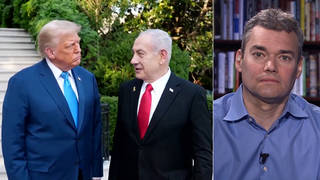
Topics
The Justice Department has told a federal appeals court there was more than enough untainted evidence to justify a trial for the five Blackwater Worldwide guards involved in the 2007 Nisoor Square massacre in Baghdad. In court papers seeking to reinstate criminal charges that were dismissed last year, the Justice Department said the judge “unjustifiably drew the curtain on a meritorious prosecution.” This legal development comes amidst a report that Erik Prince, the owner and founder of the the notorious private security firm, could be planning a move to the United Arab Emirates, a country that has no extradition treaty with the United States. We speak to independent journalist Jeremy Scahill.
Watch Part I of this interview HERE.
TRANSCRIPT
AMY GOODMAN: This is Democracy Now!, democracynow.org, the War and Peace Report. I’m Amy Goodman, with Juan Gonzalez. At the end of today’s daily grassroots global news hour, we were speaking with Jeremy Scahill, author of Blackwater: The Rise of the World’s Most Powerful Mercenary Army. Jeremy is a fellow at the Nation Institute. He’s a correspondent for Democracy Now! And he’s been doing a lot of research on special forces, among other issues that are related to Blackwater. In this web exclusive, we’re going to talk further. Juan?
JUAN GONZALEZ:
Well, Jeremy, in the earlier segment, you were talking about the expansion of the dark side, in terms of the Obama administration and the increasing emphasis on special operations as opposed to normal military. Back in the Kennedy days, because Obama likes to compare himself or be compared to John F. Kennedy, the Kennedy administration also was heavily involved in expanding special operations forces. And could you talk a little bit more about the specifics of how this is happening around the world? Maybe give us some examples in some countries.
JEREMY SCAHILL: Right. Well, I mean, what you have to understand about this is that the premier counterterrorism strike force that the US has is the Joint Special Operations Command, which is sort of an all-star team of US special forces where they pull personnel from the Navy SEALs, DEVGRU, from the Army Rangers, from the Delta Force. They have their own aviation division, which is the 160th Aviation; the Night Stalkers is their nickname.
And under the Bush administration and after 9/11, they took this force that traditionally was supposed to be deployed in countries throughout Latin America, for instance, where the US wanted to either change the leadership in those countries, overthrow governments, or wanted to support a repressive regime. And they would send in special forces to upfit their military, in other words, to improve the capability of those countries’ special forces. And it was a way of the US waging proxy wars. What happened is that Bush, in the early stages after 9/11, shifted JSOC’s focus from a training mission to direct action missions, and they formed what are called special mission units, SMUs, that would go around the world and would essentially abduct or assassinate individuals that were believed to be al-Qaeda leaders or terrorists or opponents of the United States.
And so, what the Obama administration has done is taken the lead character who facilitated that transformation, General Stanley McChrystal, and appointed him the theater commander for the entire US front line war now in Afghanistan and Pakistan. That, combined with the fact that you have Petraeus also exerting his own influence in the special forces world and issuing execute orders to operate in countries that his forces previously had not — Yemen, Somalia, elsewhere. The air strikes, for instance, that you reported on recently on Democracy Now! in Yemen that killed, I think it was, fifteen civilians or more was likely not a JSOC mission, but rather Petraeus’s sort of parallel special forces mission.
The United States special forces are now in Mexico, for instance, and in Colombia, where they are attaching themselves to the Drug Enforcement Agency. That’s what they — they go in, and they can basically become what they want to become. If it’s attaching with the FBI, they’ll do that. If it’s passing themselves off in some kind of a diplomatic capacity, they’ll do that. In those countries — in Mexico and in Colombia — my understanding is that they’re working with Colombian special forces and with Mexican special forces to give them an expertise that they maybe don’t have or to advise them on certain operations. But the lines are blurred. And oftentimes when you have these highly trained US forces in these countries and they come under some kind of fire, are they not going to shoot back?
So I’ve been given specific examples, for instance, of US forces operating in the Republic of Georgia and where they are fighting against and targeting Chechen rebel leaders. And this is happening all around the world now.
And so, Obama has opened a direct line of communication with commanders of these task forces that are doing these hits. And I’ve heard from people that are involved with planning of these missions that there’s far greater access for these sort of dark forces with the Obama White House than there was under the Bush administration, which is really extraordinary, because Bush and Cheney would often pluck people from out of the chain of command and directly order them to do something, McChrystal chief among them.
AMY GOODMAN: Jeremy, you reported on Blackwater going up for sale, on Erik Prince probably moving to the United Arab Emirates, and they don’t have an extradition treaty with the United States. How would you envision Blackwater or another agency, another company that Erik Prince could set up, operating, and how contracts work with these companies?
JEREMY SCAHILL: Well, you know, it would be really hard to place a monetary value on Blackwater at this point, because to open those books would be to go really into all the off-the-books stuff. I mean, what — the extent of the involvement of Blackwater with CIA assassination operations, for instance, how do you put a market value on that? Or on their involvement with the drone bombing campaign in Afghanistan and Pakistan?
It’s unclear if those parts of the company are going to be sold or if they’re just going to be dissolved or if they’re being — I mean, I also understand that Prince has transferred much of the sensitive business over to allies of his that used to work at Blackwater, primarily a guy named Enrique “Rick” Prado, who was a CIA paramilitary officer, a veteran of Latin America. He started his own company that no one’s reported on called Constellation Consulting Group, and my understanding is that Constellation is now doing a lot of the OGA business, the other government agency business. Cofer Black, the former vice chairman of Blackwater and a CIA career thug, is now at a company called Blackbird Technologies, which gets a lot of contracts with US special forces. I mean, we’re talking multiple nine-figure contracts on a regular rolling basis.
And so, you know, I think that if Prince wants to stay in that business and he does move to the United Arab Emirates, he probably would set up a company that was servicing the corrupt monarchies of that region. He’s very close to King Abdullah of Jordan. He’s very close to royal families throughout the Emirates. You know, he’s a kingpin in that world. So he could essentially take his operations offshore and be still paid by the United States government by providing services through proxies, meaning these gulf monarchies. And they’re notoriously corrupt, and if you’re friends with them, you don’t have to face the law, you don’t have to face any system of accountability. In a way, it’s sort of brilliant. The only irony is that he is — you know, he hates Muslims, and now he’s going to go and live in a Muslim country.
JUAN GONZALEZ: What’s been the reaction, from what you can tell, within the established military to the federal government’s apparent crackdown on an organization like Blackwater? I mean, conceivably, they’re bringing the contracting out back in house, in terms of what you’re talking about, the special operations that are being done by the military.
JEREMY SCAHILL: Well, you know, I actually discussed this recently with Lieutenant General Ricardo Sanchez and was asking him about this issue, and he said that even though we’re bringing that stuff in house, we’re still hiring individuals that are contractors. So they’re hiring their old guys to come back in. The reason Blackwater became so popular with the US special forces and the CIA was not necessarily about Erik Prince’s political connections; it was that they had the market cornered on former Navy SEALs, the most elite soldiers within the US military. So, you know, when a guys says, “I can provide you with 300 former Navy SEALs,” when you’ve got, you know, 4,000 special forces operating globally, that’s a huge number of personnel.
So what they’re going to probably do more is contracting, you know, Lockheed Martin, these big companies. Someone is going to absorb the Blackwater — the bigger sort of Blackwater aspect of this. But, you know, the military is doing that in house, but let’s remember, Juan, 69 percent of all Department of Defense personnel, not just in the wars, but the entire DOD, 69 percent are contractors. That’s incredible. Almost three-quarters, you know, roughly two-thirds of the entire DOD workforce is private contractors at every level, going all the way up. And some of the contractors make more money than the commanding generals.
AMY GOODMAN: And when President Obama says the war in Iraq will end this summer?
JEREMY SCAHILL: Well, look, he was very careful, what he said the other day. You know, he said our combat operations are going to end. They’re going to use contractors for a lot of the ongoing Iraq presence. They have that massive US embassy that’s going to necessitate US forces remaining in the country. You know, they’re going to have probably somewhere between 20,000 and 50,000 US troops that will be positioned in some form either in Iraq or neighboring. My understanding, though, I’m hearing increasingly from people connected to the Obama administration they just want to get the heck out of Iraq. To them, it is a complete burden. They want out of there.
AMY GOODMAN: And expand Afghanistan. And you have General McChrystal recently saying, “We’ve shot an amazing number of people, but to my knowledge, none has ever proven to be a threat.” That’s General Stanley McChrystal.
JEREMY SCAHILL: Right. Well, I mean, you know, the context for that also is that, you know, McChrystal was talking about the — his big thing is COIN, you know, the counterinsurgency doctrine. And a lot of times these statements by McChrystal, I think, are aimed at domestic consumption in Afghanistan to give the perception that the United States is really trying hard to make sure that they don’t kill civilians.
And yet, we’ve seen — we’ve never seen, since Vietnam probably — Juan, you mentioned Vietnam earlier — these kind of night raids, going into houses, kicking down doors, taking — you know, abducting people. We have secret prisons around the world. We have a secret prison within Bagram called the “black jail” that’s run by JSOC and the Defense Intelligence Agency. I did a story the other day about how the Obama administration is considering keeping Bagram as a secret detention facility, not for Afghans, but for third-country nationals, people that they take on the battlefield in Yemen and Somalia, essentially creating a tiny Gitmo within Bagram. Now, they haven’t authorized this yet, but it’s one of the plans that they’re considering, after they hand it back to the Afghans. So they’re going to — it’s very much like Guantánamo, in the sense that you say, well, this property belongs to the Afghans, but we’re going to set up a prison there anyway.
And, I mean, so Obama is a big fan of this kind of black operation stuff, and it’s really disturbing. It is very similar to Kennedy, Juan, in terms of public perception is one thing of the kind of person that this president is, and then the reality of his foreign policy is hammering far harder than Bush was around the world and doing it with much greater secrecy.
AMY GOODMAN: Jeremy Scahill, we want to thank you very much for being with us. Jeremy Scahill, author of Blackwater: The Rise of the World’s Most Powerful Mercenary Army and Democracy Now! correspondent and Nation Institute fellow, thanks.












Media Options